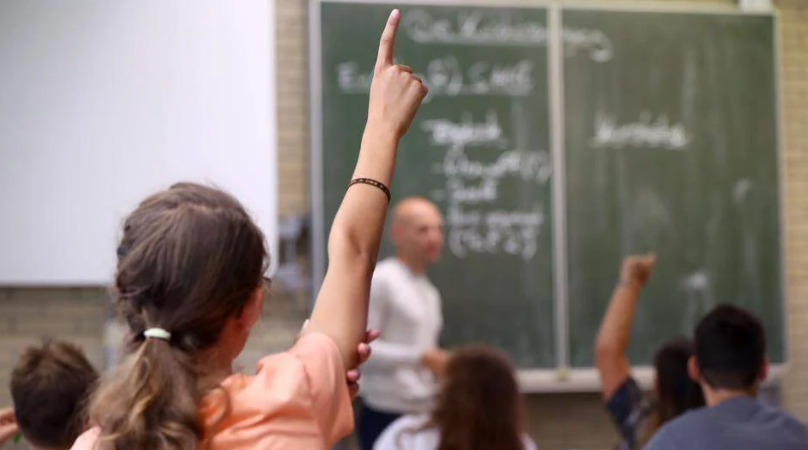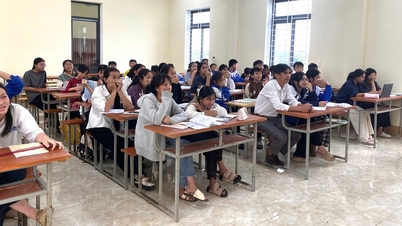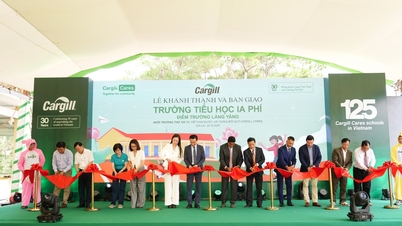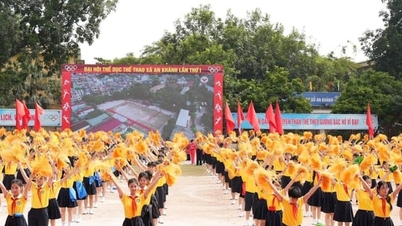The Luxembourg education system is famous for its multilingual teaching, helping students become fluent in multiple languages.

Nearly 3,000 children "cross the border" to go to Luxembourg schools every day - Photo: DPA
Every day, thousands of children from neighboring countries such as France, Germany and Belgium "cross the border" to Luxembourg to pursue their education.
According to statistics from the Luxembourg Ministry of National Education, there are currently nearly 3,000 non-resident students studying at public schools in the Grand Duchy, a remarkable number that reflects the attractiveness of the education system here.
Specifically, there are 480 primary school students and 2,228 secondary school students from neighboring countries studying in Luxembourg. Of which, Germany is the country with the largest number of secondary school students studying in Luxembourg, followed by France and Belgium.
The journey to school for these children is not easy. Leo S., 10 years old, lives in a village near Thionville (France), has to wake up very early every day to go to primary school in the capital of Luxembourg with his father.
Leo shared: "I have to wake up much earlier than my friends studying in France. And our holidays are not the same, which makes it difficult for me to play with my friends."
Leo's family, however, has no regrets about their decision to send their son to study in Luxembourg. Leo's father said they moved to France because of cheaper housing, but always wanted his son to study in Luxembourg, especially to become fluent in many languages.
Luxembourg's education system is renowned for its multilingualism, with students becoming fluent in Luxembourgish, French and German, which is one of the factors that attracts families from the border region.
In addition, the quality of education and career opportunities after graduation are also reasons why many parents choose to send their children to study in Luxembourg.
The large number of non-resident students also poses challenges for the Luxembourg education system. Schools must ensure that there are enough places and resources to meet the needs of their students.
To address this issue, primary schools require parents to seek permission if they want their children to attend a school outside their residential area. Secondary schools have autonomy in deciding whether to admit non-resident students.
The presence of border students not only benefits the students themselves, but also creates a rich cultural exchange in Luxembourg schools. They have the opportunity to learn and experience different cultures, contributing to a diverse and inclusive learning environment.
Source: https://tuoitre.vn/hang-ngan-tre-tu-cac-nuoc-lan-can-vuot-bien-qua-luxembourg-hoc-moi-ngay-20250316071451693.htm


![[Photo] Prime Minister Pham Minh Chinh and United Nations Secretary-General Antonio Guterres attend the Press Conference of the Hanoi Convention Signing Ceremony](https://vphoto.vietnam.vn/thumb/1200x675/vietnam/resource/IMAGE/2025/10/25/1761391413866_conguoctt-jpg.webp)
![[Photo] General Secretary To Lam received the delegation attending the international conference on Vietnam studies](https://vphoto.vietnam.vn/thumb/1200x675/vietnam/resource/IMAGE/2025/10/26/1761456527874_a1-bnd-5260-7947-jpg.webp)
![[Photo] Prime Minister Pham Minh Chinh attends the opening of the 47th ASEAN Summit](https://vphoto.vietnam.vn/thumb/1200x675/vietnam/resource/IMAGE/2025/10/26/1761452925332_c2a-jpg.webp)






























![[Photo] Enjoy the Liuyang Fireworks Festival in Hunan, China](https://vphoto.vietnam.vn/thumb/1200x675/vietnam/resource/IMAGE/2025/10/26/1761463428882_ndo_br_02-1-my-1-jpg.webp)







































































Comment (0)